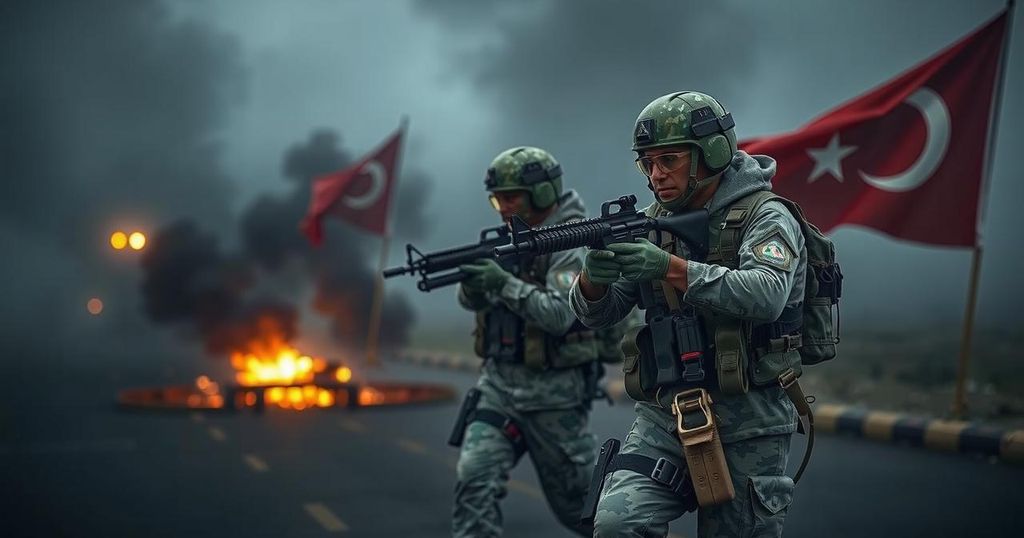Turkey launched retaliatory airstrikes in Kurdish-held areas of Syria and Iraq following an attack on a state defense firm in Ankara, which resulted in four deaths. The strikes killed 12 individuals, including children, according to the Syrian Democratic Forces (SDF). General Mazlum Abdi condemned the actions as indiscriminate, while there are ongoing peace negotiations concerning the PKK.
Late on Wednesday, Turkey executed airstrikes in Kurdish-controlled regions of Syria and Iraq as a reprisal against an attack at a state-run defense facility in Ankara. This attack, which resulted in the deaths of at least four individuals and injuries to several others, was attributed by the Turkish government to the Kurdistan Workers’ Party (PKK). President Recep Tayyip Erdogan condemned the assault on the Turkish Aerospace Industries, characterizing it as a heinous act. The Syrian Democratic Forces (SDF), an essential ally of the United States in the efforts against ISIS, reported that the air and artillery strikes had led to the death of 12 people, including two children, and additional injuries to 25 others. Turkey’s defense ministry indicated that the military action had targeted 47 sites deemed to be associated with terrorism in both Syria and Iraq. General Mazlum Abdi, commander of the SDF, decried the strikes as indiscriminate and noted their impact on civilian infrastructure, including medical facilities. He emphasized the willingness of the SDF for dialogue while asserting their commitment to defending their nation and people. Approximately 900 U.S. troops are stationed in the area as part of the coalition against ISIS, with the SDF being their principal ground ally. As of Thursday morning, neither the U.S. Defense Department nor Central Command had issued any statements regarding the attack in Ankara or Turkey’s subsequent military response. The Turkish government regards the SDF and its associated group, the YPG, as connected to the PKK, which has instigated an ongoing insurgency within Turkey for over 40 years. The PKK, classified as a terrorist organization by both Turkey and the United States, has its bases in the Qandil mountains of northern Iraq, a region frequently targeted by Turkish airstrikes. No group has yet claimed responsibility for the recent attack in Ankara, which coincided with renewed peace negotiations between the Turkish government and Abdullah Ocalan, the imprisoned leader of the PKK. Omer Ocalan, Abdullah’s nephew and a member of the Turkish parliament, conveyed a message suggesting Ocalan’s readiness to consider an end to the long-standing armed conflict. Additionally, Devlet Bahceli, leader of the Nationalist Movement Party, indicated that Ocalan might be allowed to address parliament, and hinted at the possibility of his parole in return for the disbandment of the PKK.
The ongoing conflict between Turkey and the PKK has spanned several decades, marked by violent insurgency and complex geopolitical dynamics. The PKK has been designated as a terrorist organization by Turkey and the U.S., affecting regional relationships, especially concerning U.S. military presence in Syria. The SDF’s role in the U.S.-led coalition against ISIS has positioned it as a critical actor in the region, often at odds with Turkish interests. Recent developments suggest a volatile backdrop for peace negotiations, as both military actions and political dialogues continue to unfold amid escalating tensions.
The airstrikes executed by Turkey in response to the Ankara attack illustrate the delicate balance of military engagement and peace negotiations in the region. With the loss of civilian lives and infrastructure demonstrated in the strikes, the urgency for dialogue becomes ever more apparent. As political leaders express a desire to revisit discussions with the imprisoned PKK leader, the pathway toward de-escalation remains fraught with challenges, underscoring the need for a comprehensive approach to resolve the longstanding conflict.
Original Source: www.cbsnews.com






